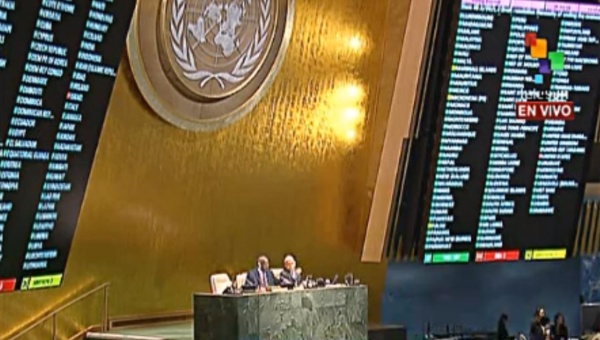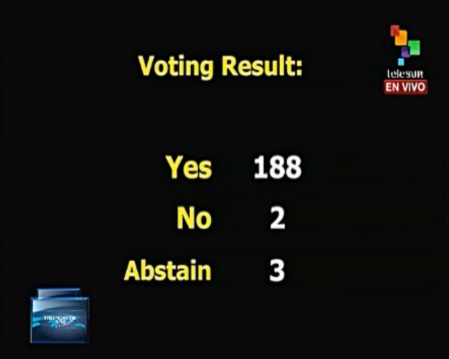For 23rd time, UN General Assembly Votes to End US Blockade against Cuba
UNITED NATIONS, 3 Nov 2014
TeleSur – TRANSCEND Media Servivce

The U.N. General Assembly voting against the U.S. blockade of Cuba on October 28, 2014. (Photo: teleSUR)
Condemnation of blockade is nearly unanimous at global body.
28 Oct 2014 – Today the General Assembly of the United Nations once again voted overwhelmingly in favor of ending the blockade of Cuba by the United States. 188 countries voted in favor of the resolution and 3 abstentions, with only the United States and Israel voting against it. The Pacific island nations Palau, Marshall Islands and Micronesia abstained. The voting result was identical to last year’s.
The blockade is the longest in the history of humankind and has imposed economic, financial and commercial restrictions on Cuba for 50 years and was enacted as a tool for U.S. foreign policy to oust a government that it opposed. It has failed to do so and has only imposed harsh restrictions on goods that have a detrimental effect on the lives and health of Cubans.
Representatives from the Movement of Non-Aligned Countries, the G77 + China, CELAC, Mercosur spoke on the topic at the U.N. today. The General Assembly also heard from several representatives from individual countries throughout the world.
Juan Carlos Mendoza, speaking on behalf of the Group of 77 countries, stated “Human lives are threatened and public health is debilitated due to the blockade, same with education, culture, sports, finance, banking, external commerce, [and] foreign investment.”
Meanwhile the Argentinean ambassador to the U.N. speaking on behalf of Mercosur told the General Assembly “The economic blockade is nothing more than an example of obsolete policies that have no place in today’s world. Now is the moment to end this morally unjustifiable blockade.”
The title of the document debated at the U.N. was “Necessity of ending the economic, commercial and financial embargo imposed by the United States of America against Cuba” and the topic has been debated at every session of the General Assembly since the forty sixth session.
The blockade has been routinely condemned by leaders from throughout the world. In the last meeting of the General Assembly 188 countries condemned the blockade. Prior to today’s meeting of the General Assembly, nearly 160 countries and international organizations sent messages calling for an end to the blockade. The New York Times editorial board has also recently come out against the blockade, current U.S. Secretary of Defense Chuck Hagel once held the position that the blockade should be lifted.
Votes of the General Assembly are non-binding and the U.S. has historically ignored calls from that body to end its blockade. However the U.S. is increasingly isolated in its position vis-à-vis Cuba, a recent poll indicated a majority of U.S. residents support ending the blockade.
Go to Original – telesurtv.net
DISCLAIMER: The statements, views and opinions expressed in pieces republished here are solely those of the authors and do not necessarily represent those of TMS. In accordance with title 17 U.S.C. section 107, this material is distributed without profit to those who have expressed a prior interest in receiving the included information for research and educational purposes. TMS has no affiliation whatsoever with the originator of this article nor is TMS endorsed or sponsored by the originator. “GO TO ORIGINAL” links are provided as a convenience to our readers and allow for verification of authenticity. However, as originating pages are often updated by their originating host sites, the versions posted may not match the versions our readers view when clicking the “GO TO ORIGINAL” links. This site contains copyrighted material the use of which has not always been specifically authorized by the copyright owner. We are making such material available in our efforts to advance understanding of environmental, political, human rights, economic, democracy, scientific, and social justice issues, etc. We believe this constitutes a ‘fair use’ of any such copyrighted material as provided for in section 107 of the US Copyright Law. In accordance with Title 17 U.S.C. Section 107, the material on this site is distributed without profit to those who have expressed a prior interest in receiving the included information for research and educational purposes. For more information go to: http://www.law.cornell.edu/uscode/17/107.shtml. If you wish to use copyrighted material from this site for purposes of your own that go beyond ‘fair use’, you must obtain permission from the copyright owner.
